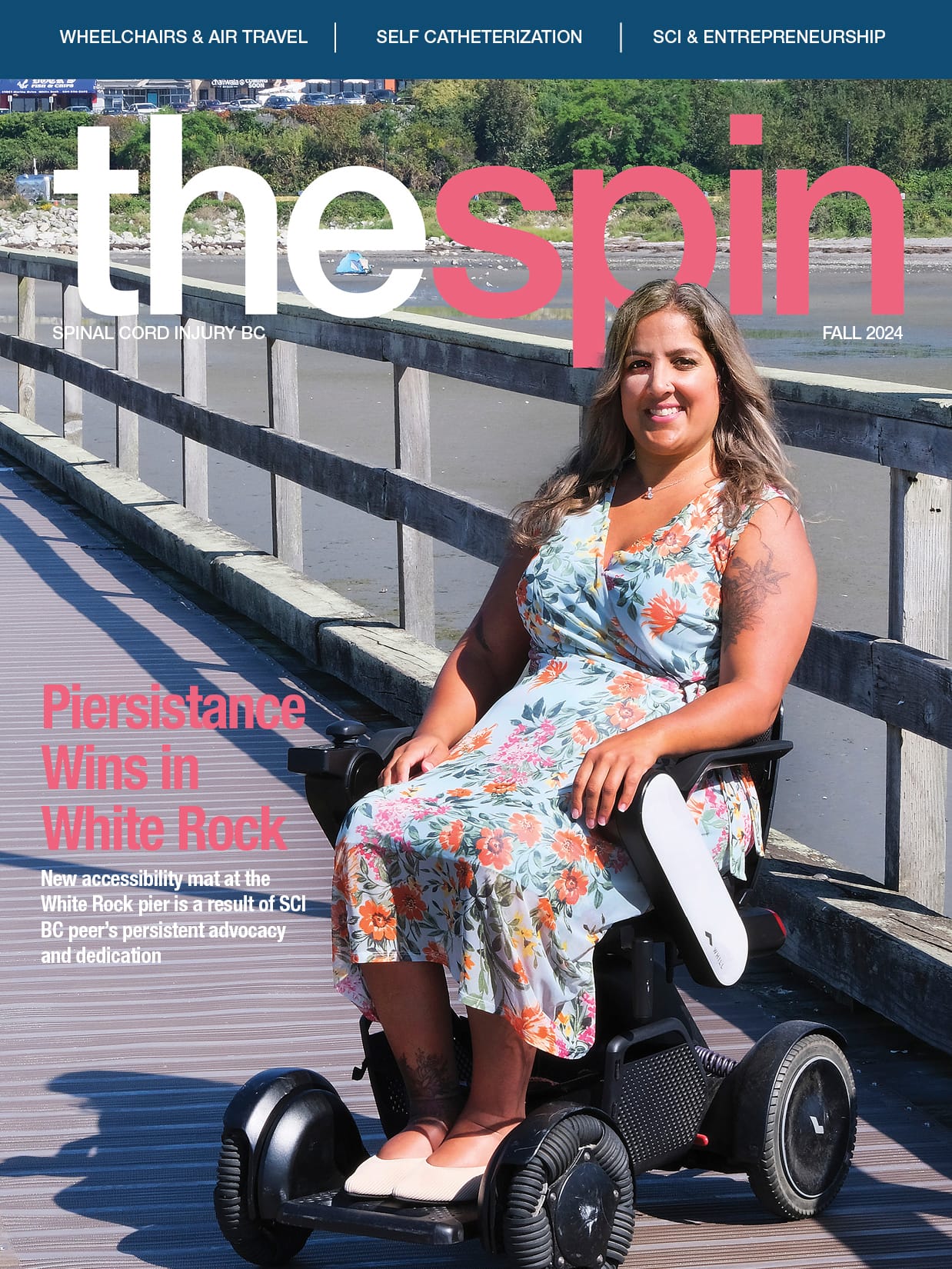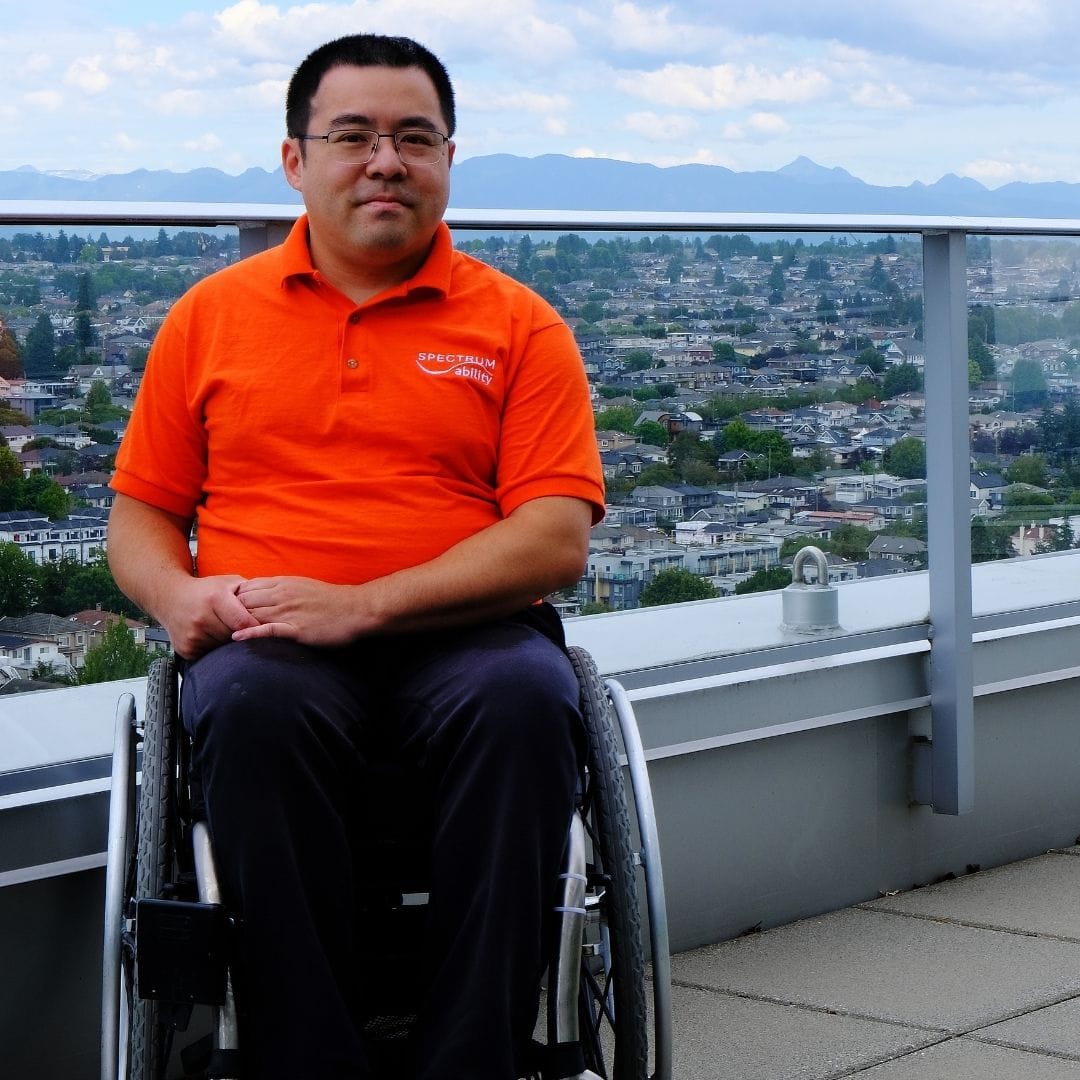
Unknowingly, SCI BC peer Arnold Cheng has been preparing to be a business owner and accessibility consultant his whole life. “I grew up being surrounded by floor plans and subconsciously absorbing a lot,” he says. Cheng’s father is a retired property manager, his brother is an architect, and his sister is a former engineer. Cheng himself has a background in graphic design and over 10 years of lived experience as a person with a disability from non-traumatic spinal injury.
Despite this personal and professional background, Cheng never considered a career in accessibility consultation until an opportunity in 2018 led to the creation of Spectrum Ability.
“It was an accidental business idea,” he says. “I got a request from my old boss at the Rick Hansen Foundation to help them with their accessibility certification pilot program. They were having trouble getting enough buildings across the finish line to satisfy the government grant they received. So, I went in to help.”
The Certification program, known as the Rick Hansen Foundation Accessibility Certification (RHFAC), is a rating system that measures and certifies the level of access of buildings and spaces. Businesses, owners, and organizations can seek a Certification rating that, in turn, helps them understand the level of mobility, vision, and hearing accessibility in any given space and how to improve. Individuals from businesses, development companies, architects, or property managers can take the Certification training themselves to learn how the ratings work and how to make a space more accessible.
Cheng took the training as part of his contract work with the Rick Hansen Foundation when the program was just getting underway, and it is the basis upon which his accessibility evaluation knowledge and business grew. “I already had a part-time job at the time and thought I would do it for a bit and then move on, [but] I didn’t expect to like it so much,” he says. “I didn’t expect the clients to keep calling and it became very apparent within 24 hours of my first client calling that I couldn’t keep this under wraps.”
After the initial contract ended, Cheng decided to take the entrepreneurial plunge and founded Spectrum Ability. “We are an accessibility consulting firm based in Vancouver, but we’ve provided services all over BC and sometimes outside of BC as well,” Cheng explains. “We look at buildings from a mobility, sight, and hearing perspective… and we give recommendations to the property owner or manager on how to improve their accessibility long term and short term, from high cost to low cost.” To date, Spectrum Ability has provided recommendations to a variety of settings including the North Surrey Ice & Sport Complex, New Westminster’s Ryall Park Community Garden, Destination Canada, the TELUS Garden office building, and The Station building at Waterfront Station in Vancouver.

The consultation process looks like this: Spectrum Ability conducts a site visit and reviews accessibility considerations from a multitude of perspectives using the Canadian Standards Association (CSA) guidelines and the RHFAC as evaluation tools and the principles of universal design as guidance. Buildings are required by law to meet the minimum standards laid out by building code, but Spectrum Ability’s goal is to help properties evolve beyond the minimum—in
other words, move from a passing grade to an A-grade. After a site visit, Cheng and his team prepare a report for the property with recommendations on how best to improve accessibility for their user demographic. “The definition of universal design is not what most people think. People think it means it’s accessible for everyone, but that’s impossible because everyone has such different needs. Everyone’s body is different. Everyone’s preferences are different,” Cheng says. “So, the definition of universal design we refer to talks about being as accessible to as many users as possible.”
This is a fine balancing act. Providing optimal accessibility to one group in the form of installing tactile indicators on the ground, for instance, may create bumpy, uneven surfaces that aren’t optimal for people who use mobility devices. “How do you balance those two?” Cheng comments. “I think the most important thing is to think about who your user profile is. Asking ‘who’ is the most important question. Who is using this building? Who is this being built for?” Spectrum Ability aims to provide recommendations that are feasible, sustainable, and based on expected users of a space. Oftentimes, the solution to an accessibility issue isn’t the most expensive or the most innovative. “While there are certain capital projects that are going to cost money, there are so many non-capital improvements that you can make. A lot of people think [that] because the accessibility symbol uses a wheelchair, that solutions and the impact you can have is limited,” Cheng says. “But one solution could be as simple as a trip to Home Depot to buy some paint and add visual variation [for visual accessibility].”
As a business owner with a disability, Cheng recognizes his unique perspective in entrepreneurship. “A lot of people might have preconceived notions of what people with disabilities are capable of…Some people have [a preconceived] idea of what accessibility means or don’t have any experience at all,” he says. “But having a disability can be an advantage because you know that people learn in different ways… You can use your body to show why a kitchen counter isn’t accessible, use your body to show why a heavy door won’t work.” The CSA guidelines and RHFAC program continue to change as new best practices are established.
For example, the CSA guideline for the optimal turning radius of a wheelchair in a room has been updated from 1500 millimetres to 2100 millimetres. Having lived experience with disability helps Cheng and his team recommend a realistic middle ground that would work for a majority while taking building restrictions and construction concerns into consideration.
Spectrum Ability’s team currently consists of Cheng, founder and general manager, Natalie Imbeau, an accessibility assistant and fellow SCI BC peer, and Henry Nguyen, a visuals and graphics specialist who brings a valuable neurodiverse perspective to the table. Notwithstanding this range of experience, Cheng believes the most important element when providing accessibility services is empathy. “It can be a misconception that because you’re in a wheelchair or have a disability that you’d automatically be a good consultant… I think being empathetic enables seeing accessibility from other people’s perspective and being willing to learn. That’s a key ingredient,” he says.
One of the biggest lessons Cheng has learned on his entrepreneurial journey is to have confidence and build trust. “[I try] to be easy going. People will make mistakes. Don’t let them worry about using the wrong word—for example, if they call you a ‘disabled person,’ just tell them what you prefer and know that you’re there to help them. It becomes more of a trust relationship.”
In general, Cheng has noticed that property management companies and commercial properties are enthusiastic accessibility stakeholders, while residential property managers and developers struggle. He recommends a mixture of incentives and legal requirements to engage these groups and emphasizes a need for more education in the industry.
Looking ahead to 2025, Spectrum Ability will continue to provide accessibility consultations and recommendations to buildings and spaces in BC and beyond. They are also eager about the possibility of contributing expertise to accessible EV charging stations and helping businesses communicate their level of accessibility in a way that everyone can understand.
Perhaps the most exciting project on the horizon is Spectrum Ability’s recently awarded bid to consult on the new Scotia Place in Calgary, Alberta. Scotia Place will replace the City’s current Saddledome arena—home to the Calgary Flames and various concerts and touring events. It is the largest consultation to date for Spectrum Ability and Cheng, as an avid hockey fan and business owner, is looking forward to contributing to the project. More than that, however, he is excited to foster more moments of realization and insight in others.
“The ‘aha moment’ that I see from clients is what I enjoy the most,” he says. “Sometimes the person who does the site walkthrough with me is the person who called me, and that’s easy. But sometimes… there’s an employee on the job who has no connection to the project or is less enthusiastic. They start to get on board and see things they haven’t even thought of before. By the end of it you can tell they’re really into it. That’s the most rewarding feeling in the world.”
Learn more about Spectrum Ability by visiting spectrumability.com.

This article was originally published in the Fall 2024 issue of The Spin. Read more stories from this issue, including:
- Peer advocacy
- Air travel
- A peer’s trip to Spain
And more!
Read the full Fall 2024 Issue of The Spin online!





